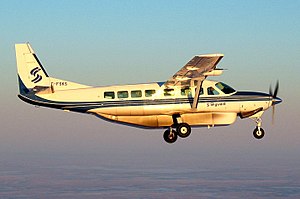C-208
| Cessna 208 Caravan | |
|---|---|
 |
|
| 208B Grand Caravan with cargo pod | |
| Role | Light turboprop transport |
| National origin | United States |
| Manufacturer | Cessna |
| First flight | December 9, 1982 |
| Introduction | 1984 |
| Status | In production |
| Primary users |
FedEx Feeder Brazilian Air Force Afghan Air Force Colombian Air Force |
| Produced | 1982-present |
| Number built | 2,500 |
| Unit cost |
US$1.95 million (208 Caravan, 2017)
US$2.53 million (208B Grand Caravan EX, 2017) |
| Variants | Soloy Pathfinder 21 |
The Cessna 208 Caravan is an American single-engined turboprop, fixed-tricycle landing gear, short-haul regional airliner and utility aircraft that is built by Cessna. The airplane typically seats nine passengers with a single pilot, although with a FAR Part 23 waiver it can seat up to fourteen passengers. The aircraft is also used for cargo operations.
The Cessna 208 is a high-wing braced cabin monoplane powered by a single Pratt & Whitney Canada PT6A turboprop in tractor configuration. It has a fixed tricycle landing gear but can also be fitted with floats or skis. The cabin has room for nine passengers and two crew when used as a passenger aircraft with four doors: one for each crew member, an airstair door on the right side of the cabin and a cargo door on the left. The aircraft can be optionally fitted with an underslung cargo pod.
The basic 208 airframe can be outfitted with various types of landing gear, allowing it to operate in a wide variety of environments. Some common adaptations include skis and floats on the Caravan Amphibian model.
The Caravan interior can be outfitted with seats or as a cargo compartment. The standard high-density airline configuration has four rows of 1-2 seating behind the two seats in the cockpit. This variant is capable of holding up to thirteen passengers, although it is marketed as being able to make a profit carrying just four. The cabin can be configured in a low density passenger configuration, with 1-1 seating, as a combination of passengers and cargo, or as a strictly cargo aircraft. Many variants include an underbelly cargo pod, which can be used for additional freight capacity, or for passenger baggage. A number of Caravans are operated as skydiving aircraft with the left-side cargo hatch converted to a roll-up door.
The prototype first flew on December 9, 1982. The production model was certified by the Federal Aviation Administration (FAA) in October 1984. A freighter variant without cabin windows was developed at the request of Federal Express as the Cargomaster. Another cargo variant for Federal Express, with a longer fuselage and a cargo pod under the belly, was developed as the 208B Super Cargomaster and flew for the first time in 1986. A passenger model, the 208B Grand Caravan, was derived from the Super Cargomaster. Since then, the Caravan has undergone a number of design evolutions, including upgrading the avionics in 2008 to provide a glass cockpit with the Garmin G1000 system. In January 2013 a higher-powered (867 shp from P&WC PT6A-140) version, the Grand Caravan EX, received FAA certification.
...
Wikipedia
